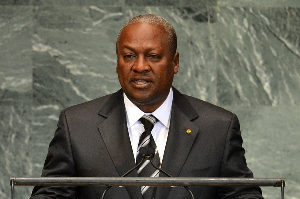General News of Friday, 9 March 2001
Source: Ghanaian Chronicle
EDITORIAL: Our Churches And Libation At Public Functions
 A news report in one of our local newspapers indicated that the Local Council of Churches in Sunyani has called for an end to the pouring of libation at public functions. According to the report, the Council considered the pouring of libation a thing of the past which draws society back if we should depend on it for success in our national endeavours.
A news report in one of our local newspapers indicated that the Local Council of Churches in Sunyani has called for an end to the pouring of libation at public functions. According to the report, the Council considered the pouring of libation a thing of the past which draws society back if we should depend on it for success in our national endeavours.
The chairman of the Council, Rt. Rev. Thomas Fampah Brient, moved his attack on libation-pouring at public functions an octave higher when he declared that 'libation pouring is a primitive act which leads illiterates, for instance, to put their belief and trust in inanimate objects.'
The chairman went further to assert that since the objects and things that are invoked during libation were all created by God, the Supreme Being, and subjected to the authority of man, 'they cannot help us.' This is not the first time this issue of libation-pouring during State functions is being condemned by members of the Christian faith. They have done so on several other occasions in the past, describing the act disparagingly as primitive, heathen and one of the causes of the woes and tribulations that have engulfed our nation.
Religious fanaticism and bigotry become dangerous social problems that threaten the peace and stability of the nation if it finds expression in one religion attempting to prevent another sect from manifesting their beliefs. Nigeria, India, Indonesia, Algeria, Northern Ireland, and the Sudan are examples of countries that have in contemporary times harvested the bitter fruits of religious fanaticism. Their tragic experiences should serve as sufficient warning to other nations to nip in the bud any tendencies towards religious fanaticism.
Ghana is a secular state that guarantees freedom of worship. Article 21 (1) (c) of our 1992 Constitution states that 'All persons shall have the right to freedom to practise any religion and to manifest such practice.' What is more, under the Directive Principles of State Policy in our Constitution, specifically in Article 35 (5), it is stated that "The State shall actively promote the integration of the peoples of Ghana and prohibit discrimination and prejudices on the grounds of place of origin, circumstances of birth, ethnic origin, gender or religion, creed or other beliefs.'
If our 1992 Constitution not only guarantees freedom of worship but enjoins the ctate to actively integrate the Ghanaian society by avoiding discrimination or prejudices in matters like ethnicity, gender and religion, then no religious sect has any right to condemn the manifestations of the beliefs of other sects, let alone prescribe their proscription. The troubles that have erupted in those countries where some forms of religion are being imposed on non-believers should guide us to avoid such pitfalls.
Ghana is a multi-religious country, and therefore, it will not be a true reflection of our national religious chemistry if only one religious sect is allowed to worship at State functions. It is not every Ghanaian who believes in traditional African religion, as it is not everyone who believes in Jesus Christ or Mohammed. It will, therefore, not be in the national interest, nor conducive to the peace, unity and stability of our nation for the state to be seen to be favouring one religious sect against others.
Rev. Thomas Fampah Brient needs to be reminded that religion has little to do with illiteracy or scholarship; for there are as many illiterate adherents in the Christian faith as there are in Islam or the traditional African religion.
The Chronicle would want to strongly advise the various religious sects to manifest their beliefs in the peace and freedom provided and guaranteed by our present democratic dispensation. No religious sect has any right to pass judgement on the beliefs and mode of worship of other sects, unless of course, these are socially repugnant.










